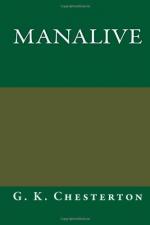“It means bosh!” roared Michael, and slung his painted spear hurtling to the other end of the garden. “It means that doctors are bosh, and criminology is bosh, and Americans are bosh— much more bosh than our Court of Beacon. It means, you fatheads, that Innocent Smith is no more mad or bad than the bird on that tree.”
“But, my dear Moon,” began Inglewood in his modest manner, “these gentlemen—”
“On the word of two doctors,” exploded Moon again, without listening to anybody else, “shut up in a private hell on the word of two doctors! And such doctors! Oh, my hat! Look at ’em!—do just look at ’em! Would you read a book, or buy a dog, or go to a hotel on the advice of twenty such? My people came from Ireland, and were Catholics. What would you say if I called a man wicked on the word of two priests?”
“But it isn’t only their word, Michael,” reasoned Rosamund; “they’ve got evidence too.”
“Have you looked at it?” asked Moon.
“No,” said Rosamund, with a sort of faint surprise; “these gentlemen are in charge of it.”
“And of everything else, it seems to me,” said Michael. “Why, you haven’t even had the decency to consult Mrs. Duke.”
“Oh, that’s no use,” said Diana in an undertone to Rosamund; “Auntie can’t say `Bo!’ to a goose.”
“I am glad to hear it,” answered Michael, “for with such a flock of geese to say it to, the horrid expletive might be constantly on her lips. For my part, I simply refuse to let things be done in this light and airy style. I appeal to Mrs. Duke—it’s her house.”
“Mrs. Duke?” repeated Inglewood doubtfully.
“Yes, Mrs. Duke,” said Michael firmly, “commonly called the Iron Duke.”
“If you ask Auntie,” said Diana quietly, “she’ll only be for doing nothing at all. Her only idea is to hush things up or to let things slide. That just suits her.”
“Yes,” replied Michael Moon; “and, as it happens, it just suits all of us. You are impatient with your elders, Miss Duke; but when you are as old yourself you will know what Napoleon knew— that half one’s letters answer themselves if you can only refrain from the fleshly appetite of answering them.”
He was still lounging in the same absurd attitude, with his elbow on the grate, but his voice had altered abruptly for the third time; just as it had changed from the mock heroic to the humanly indignant, it now changed to the airy incisiveness of a lawyer giving good legal advice.
“It isn’t only your aunt who wants to keep this quiet if she can,” he said; “we all want to keep it quiet if we can. Look at the large facts—the big bones of the case. I believe those scientific gentlemen have made a highly scientific mistake. I believe Smith is as blameless as a buttercup. I admit buttercups don’t often let off loaded pistols in private houses; I admit there is something demanding explanation. But I am morally certain there’s some blunder, or some joke, or some allegory, or some accident behind all this. Well, suppose I’m wrong. We’ve disarmed him; we’re five men to hold him; he may as well go to a lock-up later on as now. But suppose there’s even a chance of my being right. Is it anybody’s interest here to wash this linen in public?




